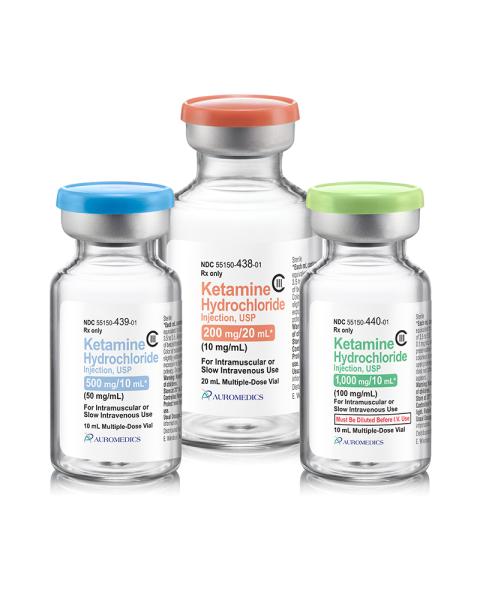Ketamine Side Effects
Medically reviewed by Drugs.com. Last updated on Oct 6, 2023.
Applies to ketamine: injection solution.
Precautions
It is very important that your doctor check your progress very closely while you are receiving this medicine to see if it is working properly and to allow for a change in the dose. Your doctor will monitor your blood, heart function, blood pressure, and breathing after receiving this medicine.
Ketamine may cause serious reactions (eg, brain or nerve problems) to children younger than 3 years of age. Discuss this with your doctor if you are concerned.
This medicine may cause liver problems. Tell your doctor right away if you have bloating of stomach, dark urine, light-colored stools, nausea and vomiting, stomach pain, yellow eyes or skin.
This medicine may make you dizzy, drowsy, or confused for several hours. It may also cause problems with your ability to think. If you have had outpatient surgery, you will need someone to drive you home.
This medicine may make you have unusual thoughts or behaviors after the surgery. You might feel confused or excited, or you might see or hear things that are not really there. You might feel as if you are dreaming while you are awake. Call your doctor if these thoughts or behaviors are severe or last longer than 24 hours.
Wait at least 24 hours after you receive this medicine before you drive, use machines, or do anything else that could be dangerous if you are not alert.
This medicine will add to the effects of alcohol and other CNS depressants (medicines that make you drowsy or less alert). Some examples of CNS depressants are barbiturates or medicine for seizures or other anesthetics, including some dental anesthetics. Check with your medical doctor or dentist before taking any of the above while you are receiving this medicine.
Do not take other medicines unless they have been discussed with your doctor. This includes prescription or nonprescription (over-the-counter [OTC]) medicines and herbal or vitamin supplements.
Serious side effects of ketamine
Along with its needed effects, ketamine may cause some unwanted effects. Although not all of these side effects may occur, if they do occur they may need medical attention.
Check with your doctor or nurse immediately if any of the following side effects occur while taking ketamine:
Incidence not known
- bloody or cloudy urine
- bluish lips or skin
- blurred or change in vision
- burning while urinating
- chest pain, discomfort, or tightness
- confusion
- confusion as to time, place, or person
- cough
- difficult, burning, or painful urination
- difficulty with swallowing
- dizziness
- dizziness, faintness, or lightheadedness when getting up suddenly from a lying or sitting position
- fainting
- fast, slow, or irregular heartbeat
- frequent urge to urinate
- hives, itching, skin rash
- holding false beliefs that cannot be changed by fact
- irregular, fast or slow, or shallow breathing
- loss of vision
- not breathing
- pale or blue lips, fingernails, or skin
- puffiness or swelling of the eyelids or around the eyes, face, lips, or tongue
- seeing, hearing, or feeling things that are not there
- seizures
- sweating
- trouble breathing
- unusual excitement, nervousness, or restlessness
- unusual tiredness or weakness
Other side effects of ketamine
Some side effects of ketamine may occur that usually do not need medical attention. These side effects may go away during treatment as your body adjusts to the medicine. Also, your health care professional may be able to tell you about ways to prevent or reduce some of these side effects.
Check with your health care professional if any of the following side effects continue or are bothersome or if you have any questions about them:
Incidence not known
- double vision
- dream-like state
- flushing or redness of the skin
- loss of appetite
- nausea
- pain at the injection site
- seeing double
- uncontrolled eye movements
- unusually warm skin
- vomiting
- weight loss
See also:
For healthcare professionals
Applies to ketamine: compounding powder, injectable solution, intravenous solution.
Cardiovascular adverse events
- Common (1% to 10%): Blood pressure increased, heart rate increased, increased pulse rate
- Uncommon (0.1% to 1%): Bradycardia, arrhythmia, hypotension
- Frequency not reported: Arrhythmia[Ref]
Respiratory
- Common (1% to 10%): Respiratory rate increased
- Uncommon (0.1% to 1%): Respiratory depression, laryngospasm
- Rare (less than 0.1%): Obstructive airway disorder, apnea[Ref]
Ocular
- Common (1% to 10%): Nystagmus, diplopia
- Frequency not reported: Intraocular pressure increased[Ref]
Gastrointestinal
Musculoskeletal
- Common (1% to 10%): Hypertonia, tonic clonic movements[Ref]
Local
- Uncommon (0.1% to 1%): Injection site pain, injection site rash[Ref]
Dermatologic
Psychiatric
- Common (1% to 10%): Hallucination, abnormal dreams, nightmare, confusion, agitation, abnormal behavior
- Uncommon (0.1% to 1%): Anxiety
- Rare (less than 0.1%): Delirium, flashback, dysphoria, insomnia, disorientation
- Frequency not reported: Psychotic episodes[Ref]
Genitourinary
- Rare (less than 0.1%): Cystitis, hemorrhagic cystitis[Ref]
Hepatic
- Frequency not reported: Liver function test abnormal[Ref]
Hypersensitivity
- Common (1% to 10%): Anaphylactic reaction[Ref]
References
1. Cerner Multum, Inc. "UK Summary of Product Characteristics."
2. Cerner Multum, Inc. "Australian Product Information."
3. (2009) "Product Information. Ketalar (ketamine)." JHP Pharmaceuticals
Frequently asked questions
More about ketamine
- Check interactions
- Compare alternatives
- Pricing & coupons
- Reviews (168)
- Drug images
- Latest FDA alerts (4)
- Dosage information
- During pregnancy
- Support group
- Drug class: general anesthetics
- Breastfeeding
- En español
Patient resources
Other brands
Professional resources
Other brands
Related treatment guides
Further information
Ketamine side effects can vary depending on the individual. Always consult your healthcare provider to ensure the information displayed on this page applies to your personal circumstances.
Note: Medication side effects may be underreported. If you are experiencing side effects that are not listed, submit a report to the FDA by following this guide.

